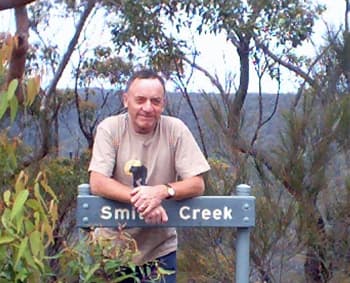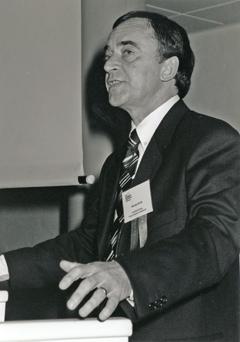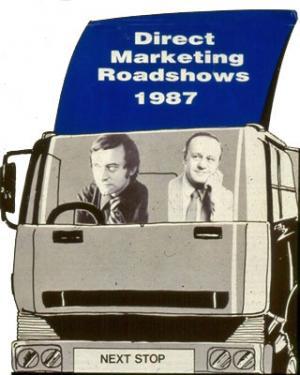UK fundraising’s premier wordsmith: George Smith
The master of asking properly and using words wisely.
- Written by
- Charlotte Grimshaw
- Added
- April 30, 2010
A profile of George Smith: guru, curmudgeon, humorist, cricket tragic.
By Charlotte Grimshaw
The many people who know George Smith for his excellent work in fundraising over many years, or for his immensely valuable book Asking Properly, might be surprised to learn just how closely involved he was in the early years of 'professional' fundraising in the UK.

George's chosen persona is the Luddite curmudgeon, baffled by modernity and resisting it with all the wit and humour at his disposal. Clients of his agency, Smith Bundy, will recall the typewriter proudly displayed (and in use) on his desk, when the world was moving rapidly to the desktop PC. He would still like to have you believe he would never own a computer if he could help it and, if he really had to learn to drive, he'd like to go no further than his local shops in Kent, preferably in a 1950s Ford Anglia.
And yet this man has been one of the prime movers in some of the most innovative, world-changing thinking, writing and campaigning in the UK in the last 50 years. A man much more moved and inspired by the issues he writes about than he chooses to reveal and quietly passionate about making a difference.
 View original image
View original image
Hard to believe now that George started his working life as a production assistant for the Amalgamated Dental Company, working on the delightfully named Oral Topics magazine, and in a print and production role for ad agency London Press Exchange. In what he describes as the privilege of 'right time, right place', he answered an ad in the New Statesman – 'Socially aware young advertising man wanted' – and became assistant to the great Harold Sumption, working on the account of the Oxford Committee for Famine Relief, in the year it changed its name to Oxfam. Together he and Harold transformed the way fundraising was done in the UK and the story of the innovative methods they brought to it needs an article all of its own.
Through a merger of Harold's consultancy with ad agency Butterfields, George found himself in 1963 working in London's Carnaby Street, traditionally the epicentre of sixties youth culture. The arrival of a young accounts clerk at the agency led to the marriage to Stella in 1964, which has been the rock and centre of a happy family life ever since.
In the rapid growth of commercial direct marketing of the late 1960s, Butterfield was taken over by Ayer and George found himself running the direct marketing subsidiary ABAyer Direct, working with charities as well as commercial accounts such as the World Record Club and Slumberdown. It's easy to see with hindsight just how much the techniques of commercial direct marketing at that time benefited the innovative thinking about charity fundraising of people like George and Harold – off-the-page advertising that brought donations flooding in, gift catalogues, hard-hitting direct mail.
 View original image
View original image
The US parent company then made him European co-ordinator for the agency, which in his own words involved, 'two or three years poncing around Europe talking bullshit…living on aeroplanes and reporting back to Philadelphia. It taught me a lot about doing business at the highest level, that everything is bollocks and that you can get away with anything by talking well.'
Then in 1970 Ayer pulled out of Europe and George was fired. This was one of those blessings in disguise for the fundraising world because, with a year's redundancy money, George started finding freelance work as a copywriter. He claims that Stella wanted a family holiday so he approached travel companies, among other things, offering to write their brochures – which he describes as a classic case of getting what you want just by asking for it, in the best fundraising tradition.
Success led to formalising things in 1973 with the formation of Smith Bundy, with Jeremy Bundy, who had also been at AB Direct, and Carol Trickey. (Who was Bundy? 'The posh one.') They continued George's long association with South London by setting up in the then distinctly untrendy Clapham Common. Smith Bundy made its money from commercial direct marketing – particularly in the area of those ubiquitous gift catalogues of the 1970s and 80s – Kaleidoscope, Innovations and so on. It was also instrumental in the development of the direct marketing programmes of many of the big charities of the time, working with War on Want, CAFOD, WWF, UNICEF and many others, and producing a gift catalogue for Oxfam. I had the privilege of running Greenpeace's fundraising when George was writing copy and creating packs for us. Those direct mail packs were some of the best we ever produced – and we had a great time creating them, which counted too.
The other benefit for the rest of us of George's redundancy was that he stood for and was elected to Lambeth Council, where he served for seven years, four of those as chairman of the arts and recreation committee, alongside Ken Livingstone. Livingstone, of course, went on to run the Greater London Council, for whom George worked on the 'Claim What's Yours' campaign in the early 1980s, using a mixture of above- and below-the-line marketing tools to educate Londoners on their rights and entitlements. He will tell you that it was the hardest campaign he ever worked on, but will also tell you proudly that it persuaded 140,000 people to claim their rights and really got up Margaret Thatcher's nose.
The Lambeth Council experience also taught him, he says, 'what you can do if you think laterally' and what you can do with persistence, citing the example that he discovered that Lambeth public library books were being thrown away after they had been read 30 times. It took him two years to persuade the Council to set up a stall and sell the used books instead of throwing them away, thus raising money for the libraries service. 'It pulled its head off', he says happily in a classic phrase from commercial direct marketing days. It is one of his repeated observations that there is far too much deference to 'the rules' and not enough innovative thinking in the modern fundraising world.
Meanwhile, Harold Sumption and John Erikson had started a small fundraising conference in the Netherlands. George resisted getting involved because of other commitments until 1986, when he succumbed and was promptly asked by Harold to run the International Fundraising Workshop (now the IFC). This he did with panache and commitment from 1987 to 1993, helping to transform it from what he described as a 'lazy' conference with a hundred delegates to a 'must-go-to' event for many fundraisers, attracting a paying audience of over 450 delegates. He will tell you that he was surrounded by a terrific team who made this possible; and who also made possible the beginnings of the IFRW's international reach with the first ex-Europe conference in Nairobi, This, of course, led to the great global resource for fundraisers that the Resource Alliance is today.
 View original image
View original image
George's work with the IFRW epitomises something about his approach, which many of us who have been fortunate enough to work with him recognise. This was evident as much in his wish that Smith Bundy should be a 'training ground' for young direct marketers as in his wish to make the IFRW truly international. I think it is best described as a great desire to see people achieve their potential, to really help others to find inspiration and to go out and make a difference. To which opinion he would no doubt respond with a characteristic cry of 'bollocks!'
As a man who likes to keep busy, he also made a further substantial contribution to the European fundraising scene at this time by backing Ken Burnett in the founding of Burnett Associates. He was a founding director and, after he left Smith Bundy, was development director for seven years. Burnetts as it was no longer exists (Oh yes it does! see here), but it trained many stars of the fundraising scene and spawned a number of today's successful social marketing agencies and consultancies.
Along with all of this of course went the monthly columns for Direct Response magazine and for Professional Fundraising, where I suspect he saw his role as the Lord of Misrule – challenging assumptions and debunking nonsense – and three years as the chairman of the Institute of Direct Marketing. Asking Properly was published in 1996 and has since reprinted. It is still a fabulously relevant source of trenchant advice and examples of great fundraising direct marketing campaigns past.
In 1993 George decided, in his words, to 'give up everything and stop being responsible'. International agencies had been making lavish offers for Smith Bundy, but again in a characteristic move he chose instead to sell his stake to his fellow senior managers and directors, and took up growing vegetables in Kent. There is no one so zealous as a new convert to gardening (except perhaps a reformed smoker) and his friends became accustomed to regular updates on the progress of George's brassicas, along with despairing emails about the England cricket team.
He hasn't, of course, stopped working, but has since enjoyed a freelance life of writing and consulting to those not-for-profits lucky enough to secure his services. He says he finds it distressing to hear from young fundraisers the words 'I didn't know you could do that', or 'nobody told me you could do that'. He still admires boldness and innovation as much as he ever did, while complaining that it is almost impossible to find in fundraising these days.
The one thing I can guarantee is that George will be deeply embarrassed by most of the opinions expressed in this profile and by the quotes we gathered from colleagues and friends that I've included in the second part of this feature.
I can't sum up what I want to say about George any better than he did himself when he wrote SOFII's feature on Harold Sumption, Guy Stringer and Leslie Kirkley: 'Good men, fuelled by a quiet zeal to make the world a slightly better place.' And in my view – in George's case – with humour, inspiration, a terrific talent for the English language, modesty and good old-fashioned cheek.
ADD TO GEORGE'S Profile:
If you have any interesting and instructive anecdotes, quotes, observations or George Smith-isms that you feel will add to this feature, please send them in to Carolina and help make SOFII better.
© Charlotte Grimshaw August 2009
Profile by Charlotte Grimshaw of Fundraising Research, formerly head of fundraising, Greenpeace UK.
Comment from Daryl Upsall, who gave George the best bit of ‘the best fundraising job in the world’.
'My career in fundraising now stretches over 26 years and in all that time there's no one who has inspired and mentored me in the way George Smith has. The first time I heard George speaking from the pulpit of the International Fundraising Congress in Holland in 1987 I knew that here was my inspiration and guide. His speeches were known as 'Rant 1' and 'Rant 2'. This was in the time of Thatcher and Reagan and George captured all the frustration, anger and enthusiasm for social change felt by those of us who were then raising funds for so called difficult causes, such as the Sandinista revolution, third world poverty and oppression, and HIV/AIDS. So George and I became comrades and friends.
In 1992 George agreed to be a professional referee for me when I applied for the post of International Fundraising and Marketing Director for Greenpeace International, on the condition that if I got the 'best fundraising job in the world' he would be allowed to carry my bags. I got it and promptly sent him and Ken Burnett around the world to take a look at fundraising in Greenpeace, warts and all. Not only was their work the cornerstone of turning this global monolith's fundraising around, but George's writings had us crying with laughter (and pain) at the pen portraits he painted of the people he met along the way and his uncensored opinions of what he thought about the quality of the fundraising.'
Based in Madrid, Spain, Daryl Upsall is chief executive of Daryl Upsall Consulting International and one of the best known and most widely respected fundraisers internationally.
Comment from Stephen Thomas, Canada. ‘It’s not only Brits and Aussies who appreciate George Smith.
George has fans, friends and admirers around the world. Like me. In 1992 I had just returned from speaking at an AFP Conference (Association of Fundraising Professionals – the North American equivalent to the IoF) in San Francisco when my Toronto phone rang. It was George. He'd seen my presentation, but had to rush back to the UK. Would I accept a gig as the first Canadian speaker at the International Fundraising Workshop (now International Fundraising Congress)? You bet I would. And could he come to Canada to check out the fundraising scene? Sure, come on over.
We gave him a royal tour when he arrived and that led to seventeen years of great Canadian involvement at the IFC.
But what I remember most about that trip was George at my boardroom table. Proudly I showed him my proposed Holland presentation. He slowly read it over, put it down, looked into my eyes and said, "This isn't good enough, Steve."
Now I was a big deal in Canada and I have a bit of a temper, but George had such an aura about him that I didn't protest – I believed him. For you know, he was right.
Since then George has been a mentor, advisor, colleague, and friend. From him I learned many things, but that day I learned that if you demand excellence from the right people, you'll get it.'
Steve Thomas is chairman and executive creative director of Stephen Thomas Ltd and co-chair of The Resource Alliance, the nonprofit that each year presents the International Fundraising Congress, in Holland.

















